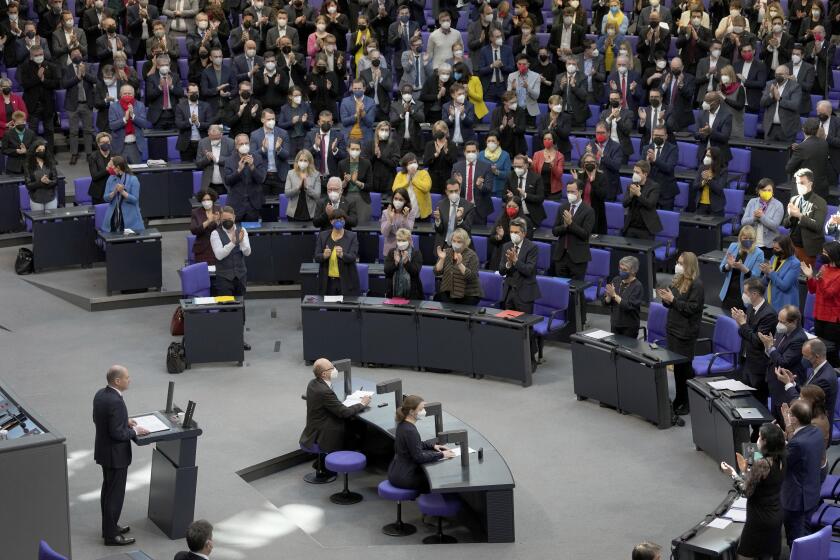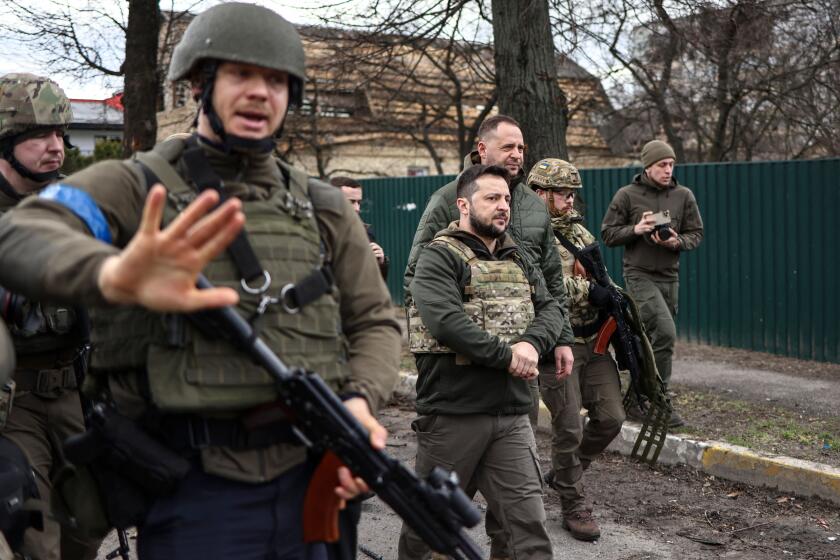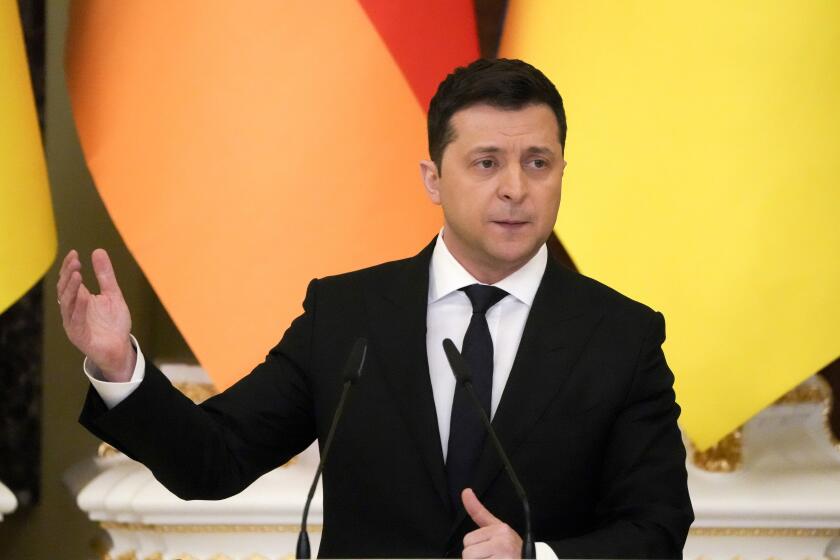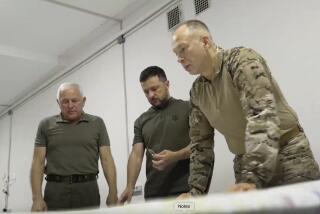Ukraine is winning — at least in the public relations battle
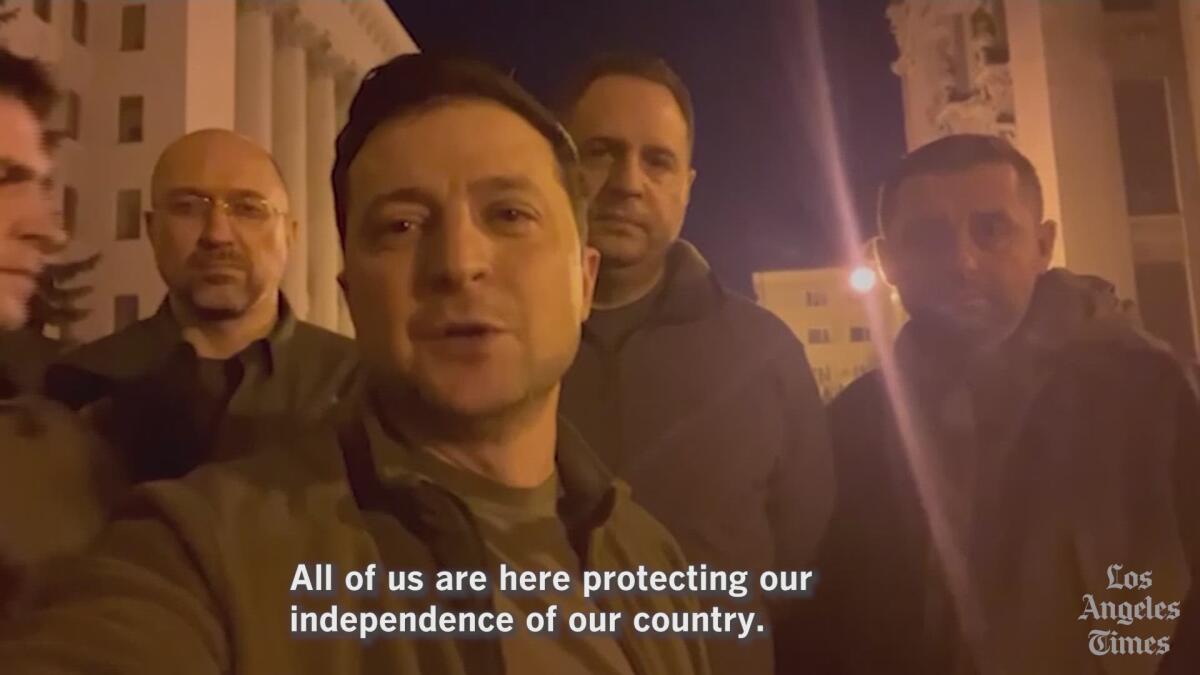
KYIV, Ukraine — As Russian bombs fell across Ukraine, the contrast between the leaders of the warring nations could not be starker.
Russian President Vladimir Putin, 69, on Sunday sat stern-faced, his tie pulled tight, at a long table with his defense officials off to the side. He appeared a solitary figure as he raged against the “aggressive actions” of the West and summoned Russia’s nuclear forces to be put on high alert.
In Ukraine, a T-shirt-clad President Volodymyr Zelensky, 44, was on the streets of Kyiv, posting yet another defiant video to social media. “I am here,” he said on the cellphone recording. “We will not lay down any weapons. We will defend our state because our weapons are our truth.”
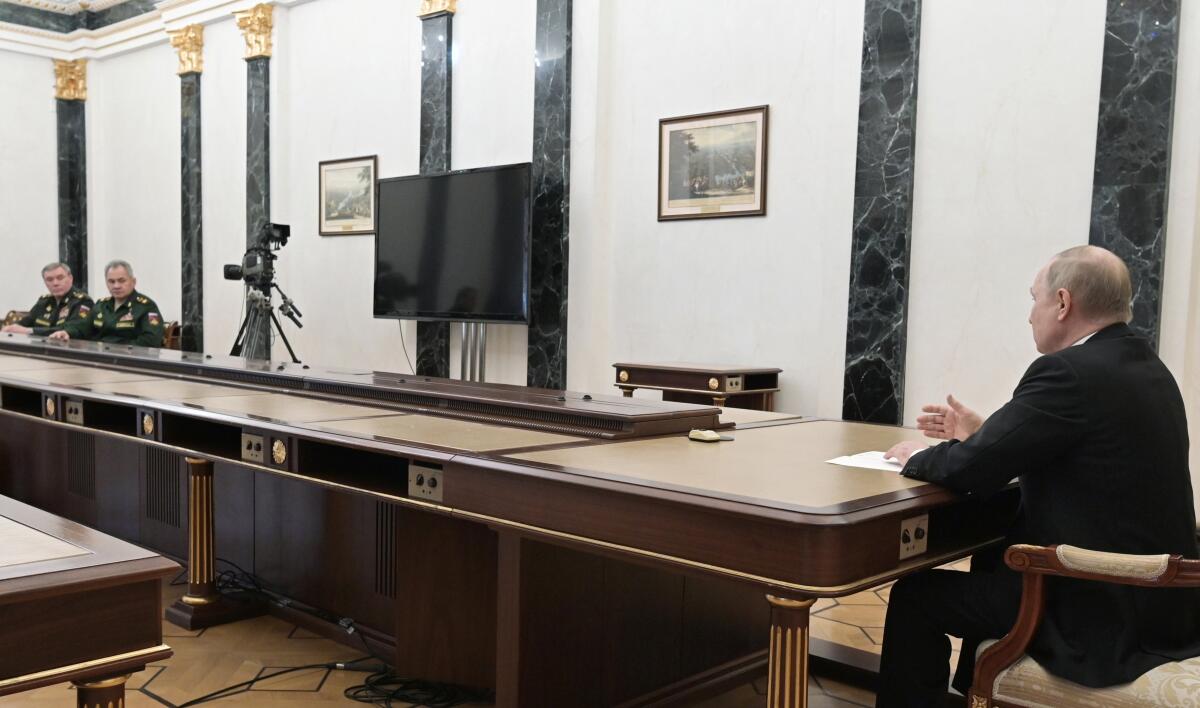
It was two different styles, two different generations, and two different visions of Europe. The war for Ukraine may be far from decided, but in the public relations battle, Zelensky is clearly winning.
A lawyer-turned-comic who wielded the power of social media to leap from playing Ukraine’s president on a popular television series to actually being elected president in 2019, Zelensky speaks to a modern Europe seeking to move beyond the nationalist tendencies that ignited two world wars.
Putin, who laments the collapse of the Soviet Union as the “greatest geopolitical catastrophe” of the last century and “a genuine tragedy” for his people, glowers, threatens and brandishes his army. A former KGB agent, he embodies the continent’s Cold War past, intent on resurrecting a world order that began to crumble back when Nintendo Game Boy was the rage and Zelensky was only 11 years old.
Russian President Vladimir Putin’s assault on Ukraine is turning his fears of a more resolute Europe and NATO alliance into a self-fulfilling prophecy.
There was a sense, as international leaders imposed ever-harsher sanctions on Russia and Putin appeared ever more isolated, that Zelensky’s quicksilver charisma and multiplatform savvy had helped give Ukraine a fighting chance against the Kremlin’s massive army and disinformation juggernaut.
Zelensky was a comedian and actor before he entered politics, parlaying his troupe, Kvartal 95, into a production company. In 2015, he starred in a hit television series called “Servant of the People” — now the name of his political party — about a history teacher who became president after a video of him ranting against corrupt politicians went viral. Zelensky announced his campaign for president while the show was still on the air.
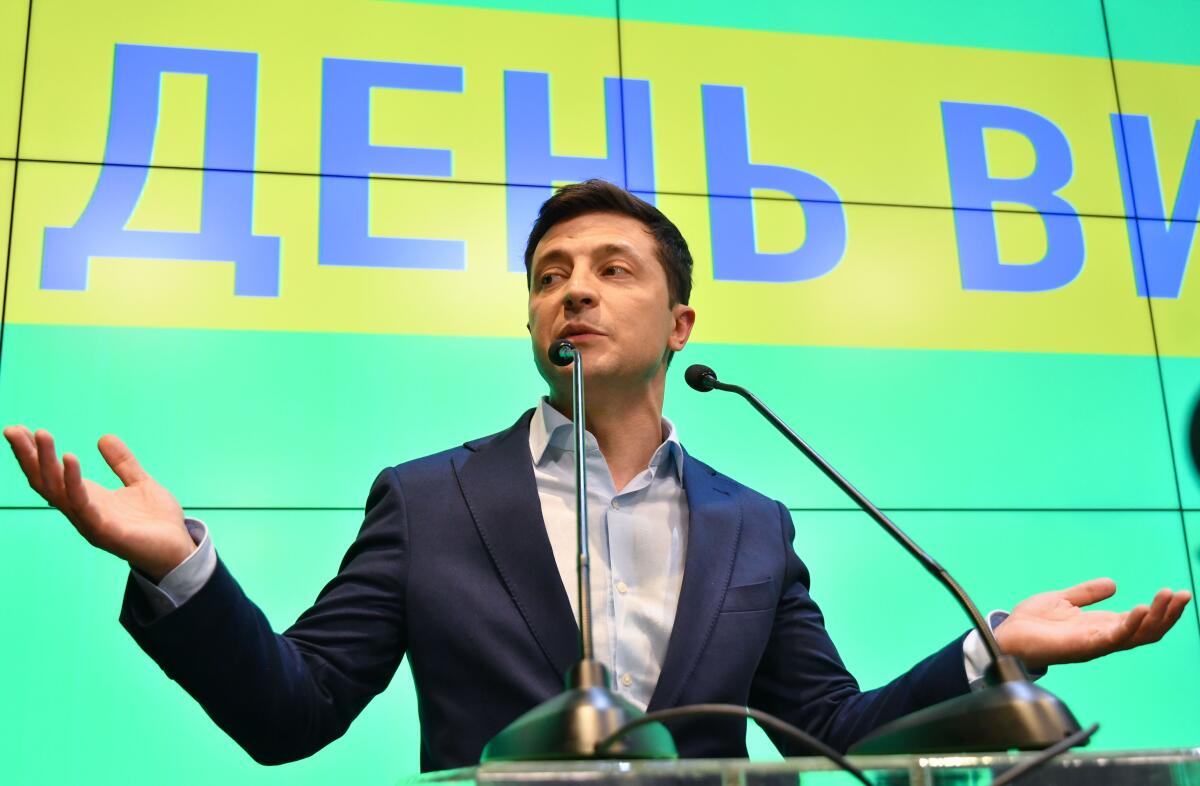
Initially brushed off by Ukraine’s political elite, he ran an energetic campaign, crowdsourcing questions on social media to ask his opponent during debates, and won with 73% of the vote. In his victory speech, he poked at Putin, whose forces five years earlier had seized the Crimean peninsula from Ukraine, and who has remained in power for decades thanks to Kremlin-controlled elections.
“To all the citizens of post-Soviet countries: Look at us,” Zelensky said. “Everything is possible.”
A woman reacts as she stands in front of a house burning after being shelled in the city of Irpin.
Zelensky’s popularity tumbled a bit after that, with critics knocking his inability to rein in the country’s oligarchs and a series of populist decrees that were more show than substance. Then there was his failed attempts at making peace with Putin, a leader accustomed to spy games, media purges and power plays, who saw a West-leaning continent and upstarts like Zelensky as a threats to his dream of resurrecting Russia’s glory.
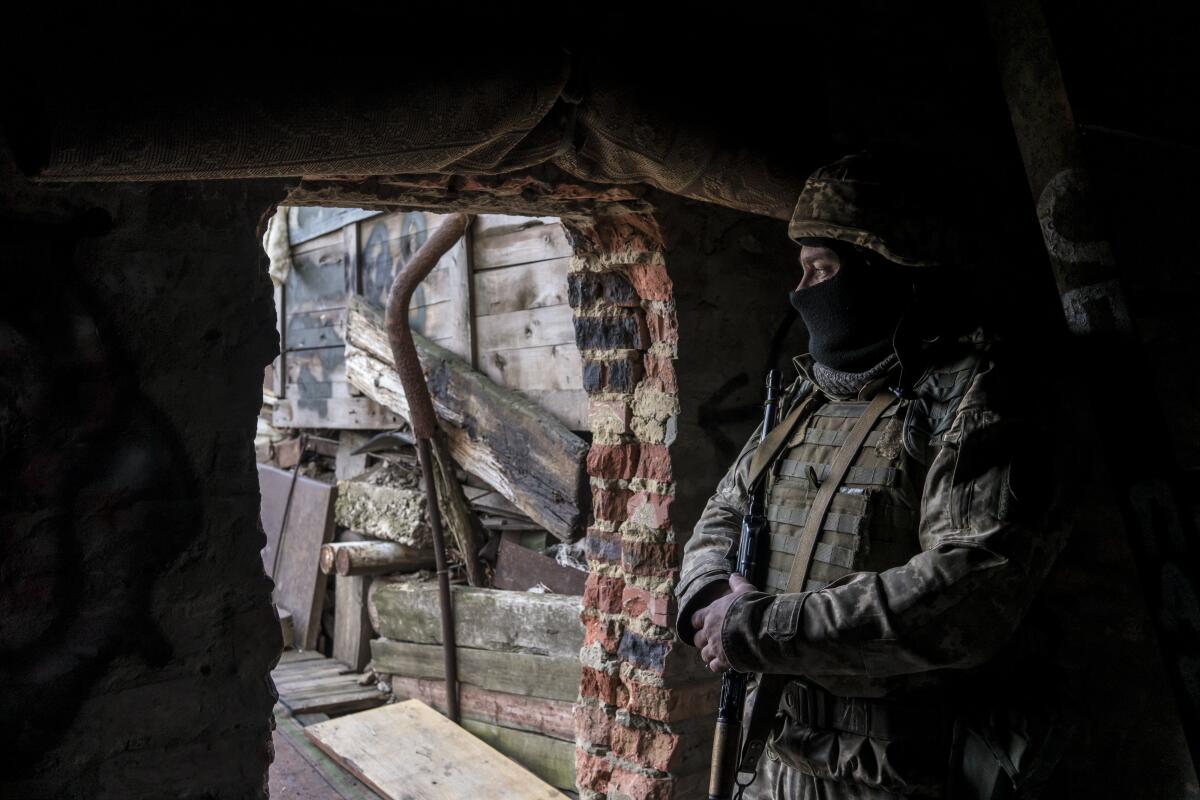
As a possible conflict with Moscow loomed in recent months, many Ukrainians wondered whether Zelensky had the steel nerves a wartime president needed to keep the country together against the formidable Russian force — as many as 190,000 troops and a land, sea and air arsenal — assembled like a noose around Ukraine. That feeling was reinforced when Zelensky kept downplaying the increasing likelihood of a Russian invasion even as Western leaders continued to sound the alarm.
But in the four days since Russia invaded, Zelensky has shone, said Illia Ponomarenko, a Ukrainian journalist with the Kyiv Independent newspaper.
“It’s not that I am now an unconditional great fan of his, but he did surprise me, in a perfect way,” she said.
Before, Ponomarenko would tell people that Zelensky loved the title “president” but not the hard work the office required. But the war, she said, “has finally triggered the best part of him.”
It’s that part of him, many agree, that has appeared every day — and often multiple times a day — in short videos on the Telegram messaging app. Like many other Ukrainians constantly on edge from the nightly missiles and explosions above the capital, Kyiv, Zelensky emerges onscreen looking red-eyed and unshaven in an army-green T-shirt.
“We are all here,” he said in one video alongside three top advisors in front of his office building to dispel rumors he was fleeing. ”We are in Kyiv. We are protecting Ukraine.”
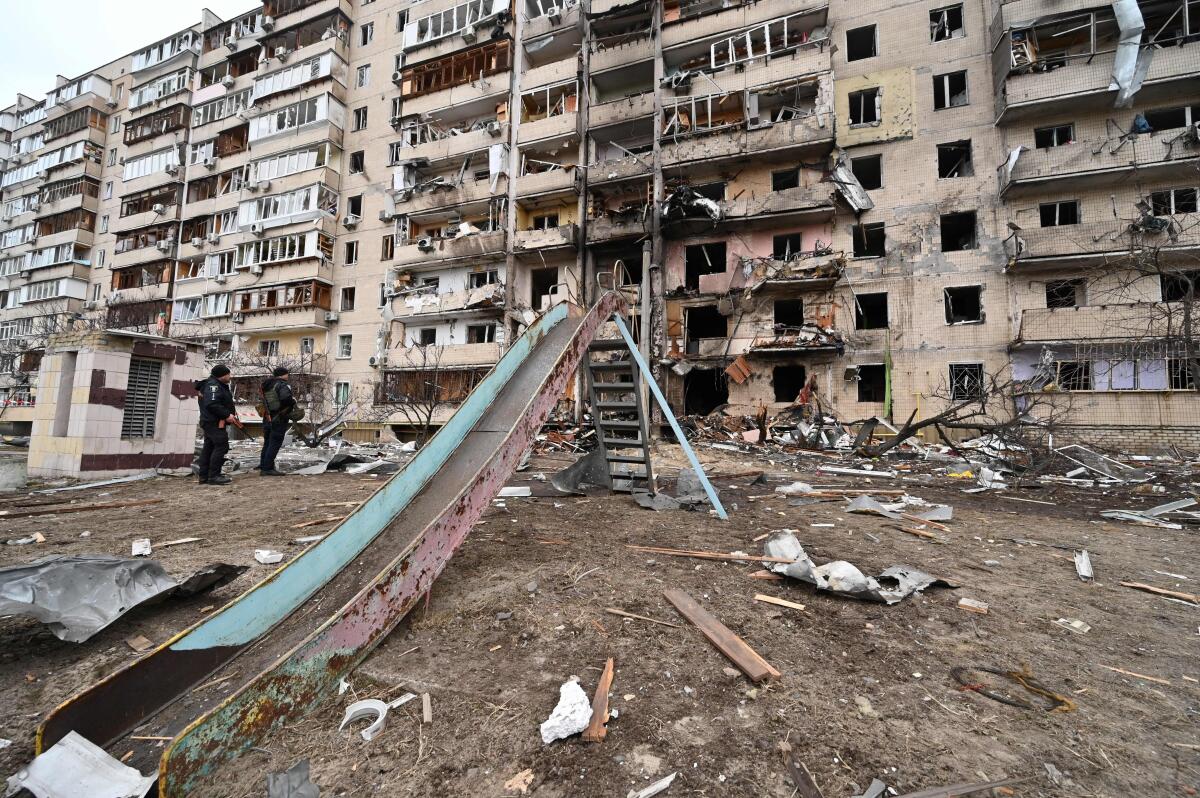
“We have got a true wartime leader who does just everything right,” Ponomarenko said. “It just blows my mind to see him being so encouraging and strong, staying in the city in its worst nightmare no matter what.”
Putin, on the other hand, has at times evoked the air of a detached and scowling villain in a John le Carre novel. In recent days, he has seemed isolated, a man sitting alone in gilded rooms while his subordinates linger like extras in the wings.
An intelligence agent who recruited spies in East Germany during the Cold War, Putin was handpicked out of relative obscurity in 1999 by then-President Boris Yeltsin to become prime minister.
As Russia moves ahead with its invasion of Ukraine, eyes are on Volodymyr Zelensky, who was elected in 2019 after finding fame as a comedian.
At first, Putin, a judo expert who has not been shy about being photographed bare-chested, appeared interested in bringing Russia closer to the West. He aligned with the U.S. after the Sept. 11, 2001, terrorist attacks, and said he believed the Baltic nations should join the North Atlantic Treaty Organization if they wanted. But after a few years, he reversed course.
To counter what he sees as NATO’s expansion into Russia’s sphere of influence, Putin has waged a war with Georgia and annexed Crimea, and appears to be on a messianic mission to avenge what he sees as the great injustice of the Soviet Union’s 1991 demise.
Since the outbreak of the COVID-19 pandemic, Putin has come off as even more focused on righting what he views are those historical wrongs. That was strikingly apparent in his televised address on the eve of the incursion into Ukraine: Speaking with a quiet but barely contained rage, he delivered an almost hourlong exegesis on why Ukraine wasn’t even a country.
In the days after, he has vowed that any party trying to impede or “create threats for our country and its people must know that the Russian response will be immediate and provoke consequences you have never seen in history.”
And unlike Zelensky, it’s unclear whether the Russian public is behind him.
The government has limited what state-run media can say about the conflict, throttled social media and banned broadcasters from using the words “war” and “invasion” (they describe it as the “special military operation”).
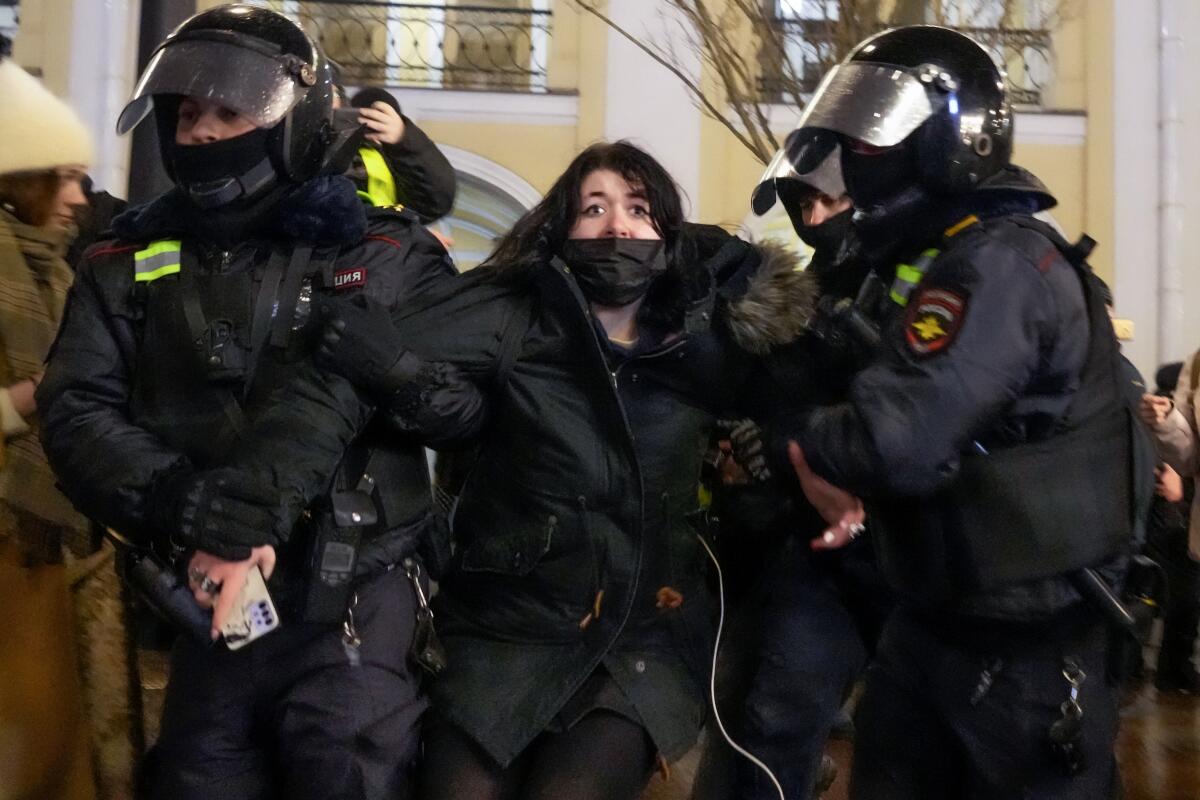
At the same time, broadcasters have maintained a steady stream of coverage of what Putin describes as the genocide facing ethnic Russians living in Ukraine’s eastern provinces. But all that hasn’t stopped antiwar protests from erupting in Moscow and St. Petersburg.
Worse, the decision to invade may have punctured Putin’s long-held image of a calculating master strategist. Many Russians are surprised Putin invaded at all, and as global opprobrium singes the country’s links to the Western world, they worry the conflict is turning their nation into a pariah — and fear Putin is willing to start a nuclear conflict to decide it.
Perhaps nowhere was the contrast between the two more vivid than in Zelensky’s appeal to the Russian people in the hours before the invasion. He spoke in Russian, his first language growing up in the central Ukrainian city of Kryvyi Rih.
“I know that they [the Russian government] won’t show my address on Russian TV, but Russian people have to see it. They need to know the truth, and the truth is that it is time to stop now, before it is too late,” he said.
“And if the Russian leaders don’t want to sit with us behind the table for the sake of peace, maybe they will sit behind the table with you.”
The next day, Putin dispatched his army toward Kyiv.
Linthicum reported from Mexico City and Bulos from Kyiv.
More to Read
Sign up for Essential California
The most important California stories and recommendations in your inbox every morning.
You may occasionally receive promotional content from the Los Angeles Times.
